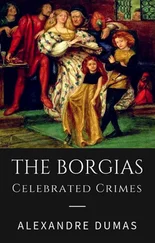The Florentines listened and many obeyed. Courtesans stayed indoors; gamblers concealed their cards and their dice boxes; fashionable ladies walked the streets dressed in quiet sober colours; balladeers closed their books of ribald songs.
In Rome Alexander VI was growing increasingly concerned about the activities and influence of Savonarola; and once the French had withdrawn from Italy after the Battle of Fornovo, he summoned the troublesome priest, now prior of San Marco, to Rome. Savonarola replied that it was not God’s will that he should go. The pope, slowly abandoning hope that the prior’s wild enthusiasm would sooner or later wear itself out, forbade him to preach anymore. But Savonarola, after instructing one of his disciples to preach in his stead, soon resumed his sermons in the cathedral in Florence.
Alexander VI was patient. ‘We are worried about the disturbed state of affairs in Florence, the more so in that it owes its origins to your preaching,’ he wrote to the fiery Dominican.
For you predict the future and publicly declare that you do so by the inspiration of the Holy Spirit when you should be reprehending vice and praising virtue. Such prophecies may easily lure the simple-minded away from the path of salvation and the obedience due to the Holy Roman Church. Prophecies like these should not be made when your charge is to forward peace and concord. Moreover, these are not the times for such teachings, which are calculated to produce discord even in times of peace, let alone in times of trouble.
The pope went on to say that he had resolved to call the friar to Rome again, either to purge himself of the charges or suffer punishment for his behaviour.
Since, however, we have been most happy to learn from certain cardinals and from your letter that you are ready to submit yourself to the reproofs of the Church, as becomes a Christian and a religious, we are beginning to think that what you have done has not been done with an evil motive, but from a certain simple-mindedness and a zeal, however misguided, for the Lord’s vineyard. Our duty, however, prescribes that we order you, under holy obedience, to cease from public and private preaching until you are able to come to our presence, not under armed escort as is your present habit, but safely, quietly and modestly, as becomes a religious, or until we make different arrangements.
Alexander VI then decreed that the Tuscan Dominicans, who had been granted their independence, should now revert to papal control as a preliminary step toward sending the ‘pestilential heretic’ to another monastery far away from Florence. The prior of San Marco declared that the pope had no authority in the matter. Alexander VI had no alternative but to excommunicate Savonarola for this attack on his supreme authority as pope.
When news of the excommunication arrived in Florence in June 1497, Savonarola remained silent for several months, praying for guidance. Then he announced that God’s word had been vouchsafed to him, and on Christmas Day he celebrated High Mass in the cathedral.
‘I can no longer place any faith in Your Holiness,’ Savonarola replied to a threat to place the whole city under an interdict, unless the Signoria either sent the prior to Rome or had him thrown into prison in Florence. ‘You have not listened to me,’ he continued. ‘I must trust myself wholly to Him who chooses the weak things of this world to confound the strong. Your Holiness is well advised to make immediate provisions for your own salvation.’
The Signoria, treated with equal high-handedness, had by now come to believe that the quarrel was getting out of hand. Savonarola’s opponents were becoming more outspoken every month; and the clergy were becoming concerned about his constant insistence that his was the voice of God. The Franciscans, in particular, long antagonized by the Dominicans’ claim to a special relationship with the Almighty, were demanding that the prior of San Marco should offer some proof of God’s exceptional favour.
Savonarola continued to preach. Soon after delivering several dramatic sermons during Lent in 1498, he was arrested by a guard and taken to a cramped cell in the Palazzo della Signoria, known with grim humour as the Alberghettino, ‘the little inn.’ From there he was taken to be tortured by the city’s rack-master.
Ambiguously he confessed all that was required of him while suffering the dreadful agonies of the strappado , but as soon as the straps had been released, he retracted his confession. He was tortured again and recanted again. In the end he was found guilty of heresy and condemned to death, together with two of his most devoted disciples. Messengers were sent to Rome for permission to carry out the sentence. Alexander VI in return sent commissioners to Florence to review the case. The commissioners, in their turn, ordered that the accused should be tortured once more to extract further admissions. The sentence was then confirmed and orders were given for Savonarola and his two fellow friars to be hanged in chains and burned.
An immense pile of brushwood was prepared; a gallows was erected in its centre; and a high platform was built from the door of the Palazzo della Signoria to the gallows’ ladder, so that all who had been disappointed by the cancellation of the ordeal might be compensated by a view of the three Dominicans being conducted to their deaths. ‘They were robed in all their vestments,’ Luca Landucci entered in his diary under the heading of May 22, 1498:
These were taken off one by one with the appropriate words for the degradation… Then their faces and hands were shaved as is customary in this ceremony…When all three had been hanged a fire was made on the platform upon which gunpowder was put and set alight, so that the said fire burst out with a noise of rockets and cracking. In a few hours they were burnt, their legs and arms gradually dropping off. Part of their bodies remaining hanging to the chains, a quantity of stones were thrown to make them fall, as there was a fear of the people getting hold of them.
‘HIS HOLINESS… THINKS OF NOTHING BUT THE WAY IN WHICH HE MAY SAFELY LAY HANDS ON THE GUILTY MEN’
‘ON WEDNESDAY 14 JUNE 1497,’ so Johannes Burchard carefully recorded:
Cardinal Cesare Borgia and Don Juan Borgia, Duke of Gandía, both dear sons of His Holiness, had supper with Donna Vannozza, their mother, and some other guests, in her villa near the church of San Pietro in Vincoli. After the meal, and since night was coming on, the Cardinal suggested to his brother the Duke that they should return to the Vatican; and so they mounted their horses and left with only one or two servants to accompany them. They rode together almost to Cardinal Ascanio Sforza’s palace, which had been built by His Holiness when he was vice-chancellor. At this point the Duke told his brother that he wanted to go out in pursuit of further pleasure before going back to the palace.
Juan, therefore, left his brother, dismissed the few servants he had with him, except for a footman and a mysterious man in a mask who had joined Juan during the supper party at his mother’s and who, moreover, had been to see Juan at the Vatican almost every day for the past month.
Juan made room for this masked man to ride behind him on his mule, and they rode off together to the Piazza degli Ebrei, where Juan told the footman to wait there an hour and then, if he had not returned, to go back to the Vatican. Soon afterward the footman was attacked and badly wounded. Discovered in a pool of blood, he was dragged into a nearby house, whose owner was so frightened that he refused to report what had happened until the next morning, by which time the man was dead.
By now Juan’s disappearance was causing consternation at the Vatican Palace. Alexander VI hoped that perhaps he had spent the night with a woman and had not wanted to be seen leaving her house in daylight. But the longer Alexander VI waited for his son’s return, the more anxious he became.
Читать дальше











